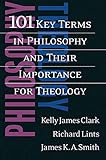101 key terms in philosophy and their importance for theology /Kelly James Clark, Richard Lints, James K.A. Smith.
Material type: TextPublication details: Louisville, Kentucky. : Westminster John Knox Press, (c)2004.Description: ix, 116 pages ; 23 cmContent type:
TextPublication details: Louisville, Kentucky. : Westminster John Knox Press, (c)2004.Description: ix, 116 pages ; 23 cmContent type: - text
- unmediated
- volume
- 9780664225247
- BR100 .K498 2004
- BR100
| Item type | Current library | Collection | Call number | Status | Date due | Barcode | |
|---|---|---|---|---|---|---|---|
 Circulating Book (checkout times vary with patron status)
Circulating Book (checkout times vary with patron status)
|
G. Allen Fleece Library CIRCULATING COLLECTION | RES | BR100 .C5415 2004 (Browse shelf(Opens below)) | Available | 31923001121546 |
Browsing G. Allen Fleece Library shelves, Shelving location: CIRCULATING COLLECTION Close shelf browser (Hides shelf browser)
Aesthetics -- Analytic/continental philosophy -- Anselm -- Anthropomorphic language -- Apologetics -- Aquinas, Thomas -- Aristotle -- Atheism -- Augustine -- Being and goodness -- Cause/causality -- Common sense philosophy -- Cosmology -- Deconstruction -- Descartes, Rene -- Dualism/monism -- Enlightenment -- Epistemology -- Essence/essentialism -- Eternal/everlasting -- Ethics -- Ethics, biblical -- Euthyphro problem -- Evil, problem of -- Existentialism -- Faith -- Faith and reason -- Feminism/feminist philosophy -- Feuerbach, Ludwig -- Free will -- Freud, Sigmund -- God, belief in -- God, nature of -- Good/goodness -- Happiness -- Hegel, Georg Wilhelm Friedrich -- Heidegger, Martin -- Hell -- Hermeneutics -- Human nature -- Hume, David -- Idealism -- Immutability and impassibility -- Justice -- Kant, Immanuel -- Kierkegaard, Sren -- Leibniz, Gottfried -- Logic -- Logos -- Marx, Karl -- Metaphysics/ontology -- Mind/soul/spirit -- Miracles -- Modernity/modernism -- Naturalism/materialism -- Natural theology -- Necessity -- Neoplatonism -- Nietzsche, Friedrich -- Nihilism -- Ockham, William of -- Omnipotence -- Omnipresence -- Omniscience and foreknowledge -- Ontotheology -- Ordinary language philosophy -- Pascal, Blaise -- Perspectivalism -- Phenomenology -- Philosophy -- Plato and Platonism -- Pluralism, exclusivism, and inclusivism -- Positivism -- Postmodernism -- Pragmatism -- Process thought -- Pseudo-Dionysius -- Realism/anti-realism -- Reason/rationality -- Reason and belief in God -- Reductionism -- Relativism -- Religious language -- Renaissance humanism -- Resurrection/immortality -- Schleiermacher, Friedrich -- Scholasticism -- Scotus, John Duns -- Self -- Semiotics -- Simplicity -- Stoicism -- Substance -- Teleology -- Theistic arguments -- Theodicy -- Transcendence -- Truth -- Underdetermination -- Universals -- Wittgenstein, Ludwig.
Written by two philosophers and a theologian, this book provides easy access to key terms in philosophy and how they are understood and used in theology. The focused entries discuss what the terms have meant in classical and contemporary philosophy and then shift to what these philosophical understandings have meant in the history of Christian theology to the present day. The result is a unique volume that clearly shows the interplay of these disciplines and how theology has been influenced by the language and vocabulary of philosophy.
COPYRIGHT NOT covered - Click this link to request copyright permission:
COPYRIGHT NOT covered - Click this link to request copyright permission:
There are no comments on this title.





